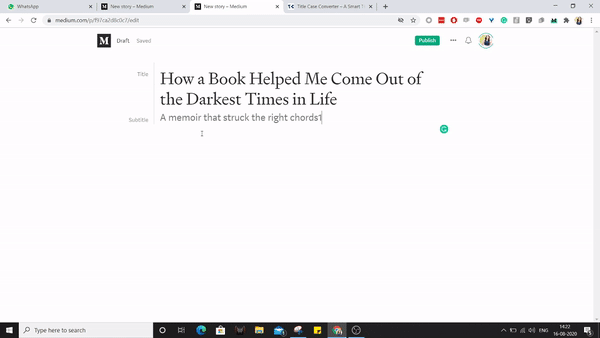Books Are Our Superpower Style Guide
Formatting tips and what to keep in mind before submitting

Formatting tips and what to keep in mind before submitting
At Books Are Our Superpower, we look for stories about books that moved you, made you feel, and changed your life.
This style guide is meant to give you the steps you can take to ensure your article is a great fit for Books Are Our Superpower. We’ll cover grammar, formatting, what topics and stories to avoid, and some ideas of what we’re actually looking for. Let’s get started.
1. Grammar
All stories published at Books Are Our Superpower go through a copyediting process, in which one of our editors makes your piece compliant with our internal style guide in terms of grammar and formatting. This helps us maintain a uniform quality standard for every piece we publish.
Please note that our editors are not paid for the work they put in, so please be considerate and make sure the article you submit is free of grammatical errors.
A free tool like Grammarly will help you in the process. They even have a browser extension that works in the Medium editor.
2. Formatting
Aside from good grammar, consistent formatting is what makes every story on Books Are Our Superpower stand out. Here is what you need to keep in mind before submitting:
2.1 Titles and Subtitles
For story titles, we prefer them in the Associated Press (AP) Style Guide format. You can do this on your own or use the Title Case Converter. Convert Case is another free tool that helps you convert title case to sentence case for your subtitle if you need to.
For the subtitle, use sentence case without any punctuation marks at the end. There should be no punctuation mark at the end of the subtitle.
Medium has published a great guide on how to format your title. All you have to do is highlight your title in the editor, then click the “Large T” button from the menu that pops up. Type your subtitle right below, then use the “Small t” formatting, and this is what you will see:

Note: Please don’t add kickers. We at Books Are Our Superpower don’t allow kickers in order to maintain consistency in the articles.
2.2 Section headers
Section headers should be formatted in title case and break up your piece into digestible sections. You can use your section headers to summarize the section or give the reader what to expect from its content.

All sections should be separated by a separator. You can add this by clicking the “+” button that appears on pressing enter. From there, select the “- -” button to add a separator between two sections in your article (screenshot attached).
2.3 Cover image
All articles in Books Are Our Superpower have a cover image that appears after the title and subtitle. You can use Unsplash for good-quality images that fit with the theme of your story.
The easiest way to add this image is to click into a new line below your subtitle, hit the “+” button on the left, then the loupe (magnifying glass) icon, and search for a relevant tag.

All images in your article must show proper attribution to their respective source. You’re free to use other free image sources as long as you credit the actual ower appropriately. Whenever you’re using your own pictures, simply add “Image: Author” as the caption.
NOTE: Please don’t add more than one image in the article unless it’s a book cover image or anything that’s especially relevant to your story. Also, please don’t add GIFs unless they add value to your story and you think they are 100 percent relevant.
2.4 Length
The ideal length of articles that consistently perform well on Books Are Our Superpower is 4 minutes or longer (800+ words). If you feel your story can be told in fewer words than that, feel free to submit, but it will depend on the discretion of our editors.
There is no maximum limit to the number of words in your article. However, the onus is on you to write clear, concise pieces that do not ramble on. Avoid fluff and fillers, and stick to the point. Aim to deliver value to the reader.
2.5 Quotes
This is a pull quote.
Pull quotes are used to highlight the lines you have written. In other words, you can pull a quote from the article and emphasize it using this feature.
“This is a blockquote.”
Blockquotes are for quoting other people. Always take care to mention the original writer (unless you are writing an article about one author, in which case, the attribution becomes apparent without stating it again.
Pay specific attention to the usage of pull quotes and block quotes. Articles with incorrect usage will not be accepted.
2.6 Book names in quotes
When you write an article like The Book that Impacted My Life the Most, make sure you include the name of the book in the sub-title so the reader knows exactly what they’re getting into while starting to read.
Also, all book names in the title and sub-title should be enclosed in single quotes.
2.7 Linking articles at the end
While we encourage writers to add links to similar or related articles at the end, please make sure you only include articles published in Books Are Our Superpower. Any links to self-published pieces or pieces published in other publications will be deleted.
3. What to Avoid
We at Books Are Our Superpower are currently looking for stories from a reader’s point of view. Feel free to write about how a book moved you, recommendations of a specific genre or mood, reading tips, and rants or discussions about a specific book or author.
3.1 Titles to avoid
The title should have a clear sense of purpose and tell the reader exactly what to expect from the article.
Don’t simply name your piece as “Book Review: Name of Book”. Instead, add an insightful sentence that makes the readers want to click on the article. Here are some examples of articles that do exactly that-
- If You Only Read One Fiction Book This Year, Read This
- Lets This Be Your First Dark Humor Book
- A Straightforward Account Of Those Living In Close Quarters With Death
- Lessons I Learned From Michelle Obama’s Becoming
- The Heart-Warming, Realistic YA Fantasy Everyone Should Read
3.2 Topics to avoid
While we try to make our publication as inclusive as possible for book lovers from all corners of the world, here are some examples of stories we would absolutely not accept:
- Promotional material full of affiliate links.
- Authors writing about why readers should read books they have written or contributed to.
- Lessons in writing or marketing that authors learned after publishing their own books.
- Listicles that ramble on and provide no clear takeaway to the reader.
4. What to Submit
The easiest way to understand whether or not your article is a perfect fit for Books Are Our Superpower is to ask yourself this: Are books and reading central to your article?
This might sound obvious, but a lot of our submissions show some authors don’t necessarily understand this core concept.
4.1 Topics to write about
- Book recommendations (10 Uplifting Books To Brighten Your Day)
- Reading tips (10 Handy Tips to Make the Best of Your Audiobook Experience)
- Discussions about concepts learned from some books (A Better Utilitarianism: Embracing Empathy?)
- Unique lessons from reading (4 Things I Learned From Reading Multiple Books at Once)
- Tips for improving reading productivity (6 Inexpensive Resources to Enrich Your Reading Experience)
- Stories about how books improved your life and relationships (How to Create a Long-Distance Book Club for Two)
- Discussions about specific authors and their writing journey (How J.K Rowling Filled the Void Left Behind by Harry Potter)
- Lessons in life and philosophy from books (Woody Allen’s Vision of Death or How to Philosophize with a Feather)
- Favorite quotes from a book and why they impacted you (5 Quotes from Moby Dick I Would Have Tattooed over My Heart)
As you can see with the examples above, we don’t aim to limit your creativity. As long as you show us why you loved a particular book or how reading helped you become a better person, there are no boundaries on what you can write about and share with us.
4.2 Types of stories to write
Your stories have to have a clear takeaway for the reader. They have to inspire the readers to pick up more books or help them incorporate the lessons from reading in their lives.
While recommending books, don’t simply copy the book blurbs from Amazon or Goodreads and paste them here. Here are three things to keep in mind:
- Include a few lines to let the reader know what they can expect from the book.
- Add a personal touch and let us know how these books impacted you.
- Conclude with a note about why the reader should pick up the book and what they can expect to gain from reading it.
5. How to Submit
When your post is formatted and ready, click on the 3 dots on the top right next to “Publish”. Select “Add to publication” and from the list that shows up, click on “Books Are Our Superpower”.
If you have not yet been added as a writer to Books Are Our Superpower, read the instructions on this article telling us a little bit about you and what kind of articles should we expect from you in the future.
Our editors should get back to you within 3 working days. Feel free to contact us if you have any further questions.
Thank you for reading. I hope this style guide was helpful. If you follow the steps outlined here, you will maximize your chances of your post being accepted in Books Are Our Superpower.
We look forward to reading what stories you come up with. Thanks and we hope you would have fun writing for Books Are Our Superpower!
Changes
April 21, 2021
- We reserve the right to accept or reject articles because we know what our readers want. The focus is not on what we want as editors, but what our audience want and appreciate.
- There might be nothing “wrong” with your article. The rejection has more to do with the kind of articles we will like to include in our publication. If your article is rejected, please take it in a sporting manner.
- Please bear in mind that any attacks on the editor’s decisions can result in a permanent ban from the publication. We are managing this publication out of our love for books, readers, and our community even as we manage other responsibilities outside BAOS and Medium. Hence, we humbly request you to treat us like humans.
March 19, 2021
- All book names in the title and sub-title should be enclosed in single quotes.
- No adding links to articles published in other publications at the end of an article.
January 26, 2021
- Strict regulations regarding the usage of pull quotes and block quotes.
- No using more than one image in the story unless they are book cover images or they add special value to the article.
September 30, 2020
- No punctuation marks in subtitles.
- Added section 2.5 to differentiate between pull quotes and block quotes.
